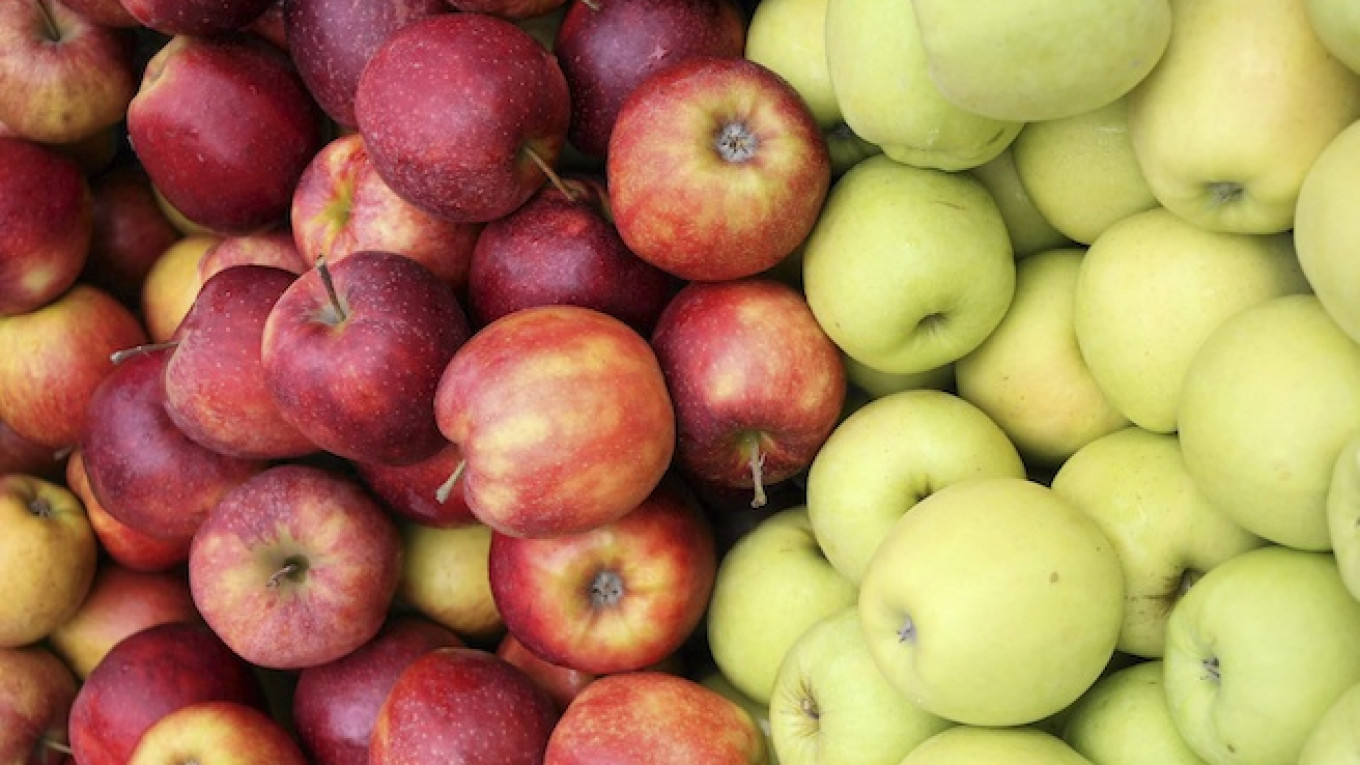Russia has escalated an economic battle set off by the crisis in Ukraine with a ban on all food imports from the U.S. and on fruit and vegetables from the European Union, dropping any pretense these might be for food safety reasons.
The import ban, reported by state news agency RIA Novosti on Wednesday, comes after Russian President Vladimir Putin ordered retaliation for Western sanctions against Moscow.
Russia is a major buyer of European fruit and vegetables but ranks 23rd among buyers of food from the U.S., accounting for less than 1 percent of America's farm exports.
The White House said the ban would backfire, hurting Russian citizens by pushing up inflation.
"Retaliating against Western companies or countries will deepen Russia's international isolation, causing further damage to its own economy," said Laura Lucas Magnuson, a spokeswoman for the White House National Security Council.
Putin signed a decree on Wednesday halting or limiting imports of agricultural products from countries that have imposed sanctions on Russia, ordering his government to come up with a list of imports to be banned for a year.
"[All food products] that are being produced in the U.S. and being supplied to Russia will be banned," RIA Novosti quoted Alexei Alekseyenko, spokesman for the Federal Veterinary and Phytosanitary Inspection Service (VPIS), as saying. "Fruit and vegetables from EU will be covered by the total ban," he added.
No one was available for comment at the VPIS, but earlier Alekseyenko said retaliatory action would be "quite substantial" and would include U.S. poultry. Russians have a strong appetite for U.S. chicken, buying 276,100 tonnes of it last year, or 8 percent of U.S. exports.
A spokesman for the European Commission in Brussels said he had no immediate comment.
Russians bought 21.5 percent of EU vegetable exports and 28 percent of the bloc's fruit exports in 2011.
The U.S. National Chicken Council and Poultry & Egg Export Council said it did not expect a great impact on the industry from the ban, while farmers said ordinary Russians could suffer.
"This is clearly a political move. It is unfortunate that the biggest losers in this will be Russian consumers, who will pay more for their food now as well as in the long run," said Bob Stallman, president of the American Farm Bureau Federation.
In the past, Russia has banned a variety of U.S. foods, citing health and safety concerns, but Wednesday's action makes its language on terms similar to that of the U.S. and EU, which have imposed sanctions on Moscow.
Explicitly banning a country's products for political reasons would violate the rules of the World Trade Organization, which Russia joined in 2012.
After Putin issued his decree, the VPIS said it would discuss an option to increase food imports from Ecuador, Brazil, Chile and Argentina with the countries' ambassadors on Thursday.
Brazilian producers could send an additional 150,000 tonnes of chicken per year to Russia to make up the shortfall, Francisco Turra, president of the country's animal protein association, ABPA, said in Sao Paulo.
Washington and the EU first imposed sanctions after Russia annexed Crimea from Ukraine in March and tightened them after a Malaysian airliner was shot down last month over territory in eastern Ukraine held by pro-Russian rebels. Moscow rejects Western allegations that the rebels used a missile it supplied to bring down the airliner, killing all 298 people on board.
East-West relations soured further on Wednesday as NATO said Russia might use the pretext of a humanitarian mission to invade eastern Ukraine.
Until now, smaller or poorer countries have featured prominently among those targeted by the Russian response. Moscow has already suspended beef and cattle imports from Romania, citing an outbreak of mad cow disease, and banned Ukrainian juice and dairy produce, Polish vegetables and Australian beef.
Russia's Central Bank warned that such bans on importing cheap products could make it harder to control inflation, which fell to an annual 7.5 percent in July, but remains well above the 6.5 percent rate in 2013.
See also:
Putin Strikes Back Against Sanctions With Food Import Bans
Russia Bans Imports of Romanian Beef as Sanction War Escalates
A Message from The Moscow Times:
Dear readers,
We are facing unprecedented challenges. Russia's Prosecutor General's Office has designated The Moscow Times as an "undesirable" organization, criminalizing our work and putting our staff at risk of prosecution. This follows our earlier unjust labeling as a "foreign agent."
These actions are direct attempts to silence independent journalism in Russia. The authorities claim our work "discredits the decisions of the Russian leadership." We see things differently: we strive to provide accurate, unbiased reporting on Russia.
We, the journalists of The Moscow Times, refuse to be silenced. But to continue our work, we need your help.
Your support, no matter how small, makes a world of difference. If you can, please support us monthly starting from just $2. It's quick to set up, and every contribution makes a significant impact.
By supporting The Moscow Times, you're defending open, independent journalism in the face of repression. Thank you for standing with us.
Remind me later.


